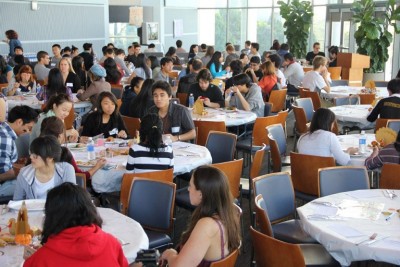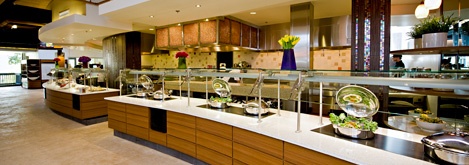
If we are to believe that there is truly a growing anti-Semitic presence on all college campuses these days, then what you’re about to read won’t make sense.
Last May, I walked in front of the Israel “Apartheid” Wall at my campus during Justice in Palestine Week, wearing my yarmulke, and a member of Students for Justice in Palestine called me a name. The name that the SJP member called was certainly not something I anticipated being called at that time or place.
“Hi Zev!”
In what world is an SJP affiliate going to be friendly to an openly Zionist, visibly Jewish student wearing an Israeli flag T-Shirt during the most contentious week of the year for pro-Israel students in front of the largest icon for the BDS movement on campus?
This only occurs in a crazy world where Jewish and Muslim students can recognize one another for being what we truly are at the core: Peers.
As I’ve hinted at in previous posts, since late 2013, my campus Union of Jewish Students has been working with the University of California San Diego’s Muslim Student Association on a joint advocacy project to increase the offerings of Kosher and Halal foods in our campus dining halls. After months of collaboration, we’re ready to announce that UCSD will be opening an all-halal dining hall in 2016, with a separate station for kosher food preparation and serving.
Moving forward, the years of contentious BDS fights and pattern of Jewish-Muslim issues that my campus has endured for years will need to end by necessity of survival. Only one of the campus’ seven dining halls will cater exclusively to the needs of Jewish and Muslim students. The facility will also have shared prayer space and meeting rooms for all faith groups to hold religious and social gatherings. Jews and Muslims will need to cooperate to maximize the benefits from the first kosher/halal space in the state.
And that’s a process that’s already begun here. In November, we brought 30 students, Jewish and Muslim into an overcrowded room to discuss what we wanted to see in this new dining facility. The learning experience gave us an opportunity to find common ground. The new prayer space will be angled to adequately satisfy the need to face Mizrach, east towards Jerusalem, for Jews and Muslim students’ need to face Mecca at 23 degrees northeast. Joint seating and meeting areas will accommodate and encourage interfaith interaction.
The kosher and halal stations will be adjacent and will bring the communities together, prompting me to jokingly refer to this project as the “Two-Station Solution” for campus dining.
This comes at the right time for UCSD and for campuses across America. A public perception that anti-Semitism is rising on campuses was capped last week by the release of the David Horowitz Freedom Center’s rankings of top anti-Semitic campuses and the Jew-Hatred On Campus Awareness Week. Posters for this event were found at UCLA (who makes the top 10 campuses as per the Horowitz ranking) depicting SJP’ers as “#Jewhaters.”
I may not agree with everything (or anything, really) that SJP says or does on campus, but to demonize their membership as inherently anti-Semitic is wrong and misleading.
Just as most members of campus pro-Israel groups are also members of UJS’s and JSU’s, SJP and MSA share a large amount of overlap — in practice, the two organizations have separate stated missions while maintaining very similar memberships. At UCSD, the annual Justice in Palestine Week is actually hosted by the MSA—the same group that partnered with UJS on the kosher/halal initiative.
Disagreements are bound to occur in any functioning group — particularly on a diverse and broad campus like UC San Diego. Differences, whether political, religious, gender-specific or ethnic, as the cultural theorist Stuart Hall wrote in “The Significance of the Other,” do not prevent us from forming cultural partnerships with one another. We can still work toward unity, despite initial circumstances that may seem to preclude partnership.
Now is not the time to be forcing more wedges between the faith groups. Political differences can, do, and should exist between Jews and Muslims on campuses — but that cannot define the entirety of our relationships. It’s entirely unfair to refer to a group of students, my friends, really, as Jew haters because a Jew hater does not spend hours advocating to campus leaders for the rights of Jewish students to eat kosher food on campus.
We’re definitely a long way away from achieving a resolution of “Two Station Solution”-caliber answer for Israel-Palestine divides on campus. But through faith-based partnership on other issues, maybe someday Jewish and Muslim students will be able to discuss politically contentious issues civilly, like the peers that we are.
Zev Hurwitz is a student at UC San Diego.

